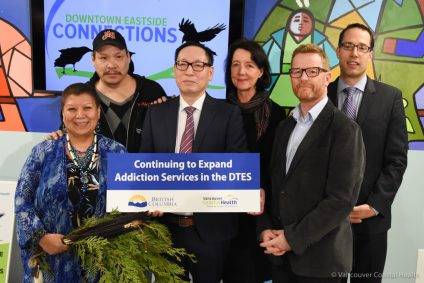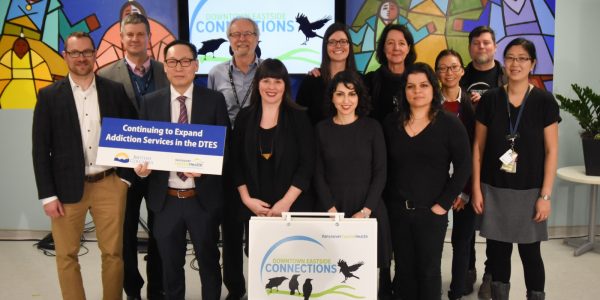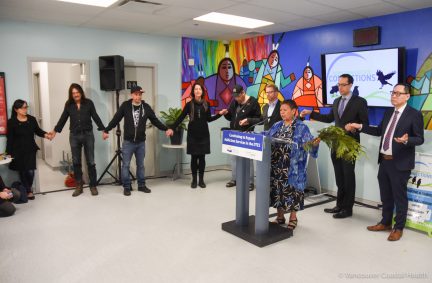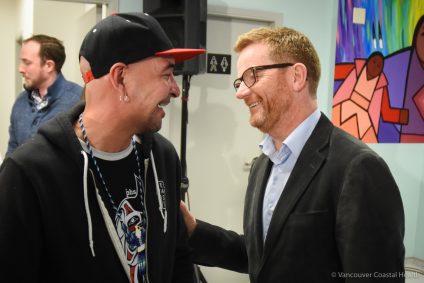“From door to first dose within two hours”
VCH Vancouver’s DTES Connections on demand addictions treatment clinic opens

DTES Connections Participants. From Left: Roberta Price, Elder; Rob Morgan, Connections Peer Advisory Group member; Dr Ron Joe, Associate Medical Director, Addictions, Vancouver Community; Monika Stein, DTES Connections manager; Health Minister Terry Lake; and Dr Evan Wood, Medical Director, Addiction Services, VCH & Director, BC Centre on Substance Use
“Addiction is not a moral choice. It’s not a matter of will power. It’s a medical condition that requires evidence-based treatments and compassion. As part of Vancouver Coastal’s Second Generation Strategy to improve the quality of life for people in the Downtown Eastside, people coming to the DTES Connections clinic will find both.”
~ Health Minister Terry Lake
Minister Terry Lake was on hand Monday (February 27) at the official event to mark the opening of DTES Connections, VCH Vancouver’s new on demand addictions treatment clinic to help people with untreated substance use issues get the care they need to turn their lives around.
“As an addictions doctor for many years, I’ve seen first-hand how addictions can tear apart families and rip away lives,” said Dr. Ron Joe, Associate Medical Director, VCH-Vancouver Addiction Services, speaking on behalf of VCH at the event. “In my experience, there is a small window of time where people with untreated addictions will make that decision to get the help they need. In that brief moment, we have to be ready and available to help them. That’s why DTES Connections was created – to offer people with untreated addictions door-to-first dose treatment in less than two hours.”
At the new DTES Connections, which opened to clients on March 1, 2017, anyone can walk in, no appointment required, and start to turn their lives around right away.
The clinic-based and outreach services associated with DTES Connections are new resources for substance users, including those who have been unsuccessful accessing treatment previously. Through the new clinic, Connections staff can support the client journey at a pace and with an approach that works for them.
“Connections reduces the barriers for people on the Downtown Eastside to accessing care,” added Dr. Joe. “Many people can’t get on treatment because of the way other programs work, like requiring appointments or requiring clients to be abstinent from substances. We created a program in a way that uniquely matches the patients’ lifestyles so there will be more chances of success.”
Connections will provide a warm, safe, walk-in environment where people can access as many or as few services as they want, seven days a week, including:
- Evidence-based addictions treatment (including methadone and suboxone, which have an 80 per cent success rate);
- Harm reduction education, clinical support and peer support; and
- A drop-in environment offering nutrition, safety and connections to other clinical services
The new clinic will be able to stabilize people and then connect them to other longer term health services/resources in the community as clients continue on in their health care journey.
Physicians and pharmacists will be on-hand to give clients opioid replacement therapy and medication for other conditions, such as HIV and psychiatric illnesses.
The Connections care team also include on-site nurses, social workers, community and financial liaison workers, and peers who have first-hand experience with street life and substance use.
Peers like Rob Morgan, a former injection drug user, were instrumental as advisors during the planning process, to ensure the clinic truly meets clients’ needs.
“I was using with my friend and the next day I saw her get carried away in a body bag,” says Morgan. “It was then that I decided to quit, but the craving was so strong I needed to talk to someone at that very moment…having a clinic right in the Downtown Eastside that you can just walk into will help save so many people.”
Connections will treat over 600 people annually, on top of the estimated 3,000 to 3,500 people throughout Vancouver currently being treated for substance use issues through various other programs.




Patrick Smith
Sweet